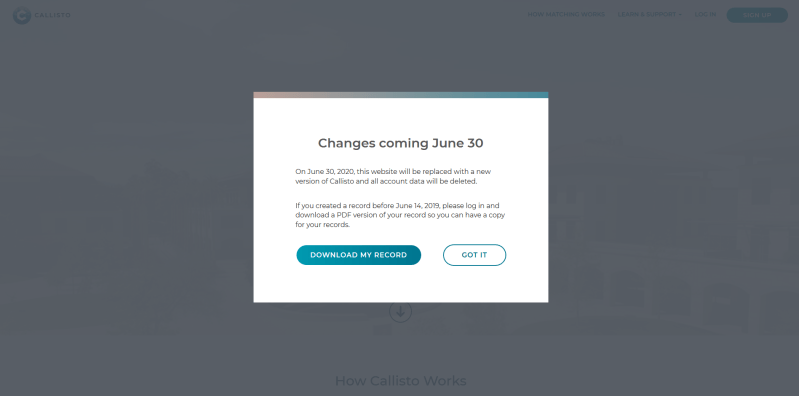Callisto Campus, a tool available for Stanford students to document and report sexual and relationship violence, will be discontinued on June 30 and replaced with another version of the program.
Callisto is a third-party online platform that allows students to document and time stamp experiences with unwanted sexual conduct. If a student is not ready to submit a report to the University, their report is saved in the system, with the option for it to be submitted later.
“One of the unique features about Callisto was the ability to have your report be submitted to the Title IX office in the event that the perpetrator that you had listed also matched the perpetrator another survivor listed,” wrote former ASSU President Shanta Katipamula ’19 M.S. ’20 in an email to The Daily. While chair of the Undergraduate Senate, Katipamula also authored the bill proposing the three-year pilot of Callisto in 2016.
While Callisto Campus will be discontinued, this year Callisto will launch a new product that connects victims of sexual misconduct to attorneys who help them understand actions they can take, according to the Callisto website. Stanford students will have free access to this platform, but the University is still deciding whether to initiate a new partnership with Callisto, according to ASSU Co-Director of Sexual Violence Prevention Krithika Iyer ’21.
“We are investigating what a potential partnership would entail, and whether a new Stanford-Callisto partnership would be beneficial for survivors,” Iyer wrote. “We will be seeking input from the student community.”
“Callisto is transitioning some of its services over the summer and it will no longer be based on a partnership model with individual schools,” wrote Senior Associate Vice Provost for Institutional Equity and Access Lauren Schoenthaler in a statement to The Daily.
An update on the Callisto Campus website initially read that the service would be replaced with a new version of Callisto and that all account data would be deleted, quickly leading some to raise concerns.
“This would undermine the ability of the platform to identify repeat perpetrators on campus,” Iyer wrote.
Stanford Law professor Michele Dauber was one of the individuals who reached out to Callisto to share her concerns. One of her concerns was Callisto’s inability to inform users that their data would be deleted.
“Because there are no records kept of who the users are, Callisto doesn’t stay in contact with their end-users,” Dauber said. “In other words, if you were someone who had made such a report, you wouldn’t get an email from Callisto saying, ‘we’re changing our business model.’”
She spoke to the trauma that this could create for survivors who had placed their trust in the platform.
“They had trusted this entity because it was created by survivors and then found that all of their information had been deleted when they didn’t know it,” she said.
Callisto has since reversed its decision to delete the data.
“With respect to the feedback we have received from our partners and the extraordinary challenges posed by COVID-19, we are not deleting this data,” wrote interim Callisto CEO Tina Robilotto in an email to The Daily. “We will maintain the record data even after Callisto Campus is decommissioned and the new product is launched to our partner campuses.”
“While I understand that they’ve now understood the error of this decision and are no longer going to be deleting records, the initial decision to do so was poorly communicated and breached the trust survivors had placed in their system,” wrote Katipamula.
Dauber complimented Callisto’s “willingness to admit a mistake and reverse it.”
Schoenthaler said that Callisto had informed the University on Thursday morning that it no longer had plans to delete the records, calling it “great news.”
Dauber urged students to download reports they had made to Callisto to ensure they are preserved, and Iyer made a similar recommendation.
“While Callisto has committed to not deleting any records, the ASSU recommends that students download their report if they want to be absolutely sure that they retain a permanent copy,” Iyer said.
Despite Callisto Campus’s unique function, Iyer told The Daily that the platform has not been sufficiently advertised to students and that she hopes to increase awareness about it in following years.
“Data from the AAU survey indicate that only 9% of Stanford students are aware that Callisto Campus is an available resource,” she said. Iyer also reported efforts to ensure that Callisto is included in New Student Orientation information sessions next fall.
Dauber called the episode a “cautionary tale” about Silicon Valley’s tendency to rely on technology to solve problems.
“I think Callisto came from the best of intentions but also was riding that wave of easy assumptions about technical fixes for a very hard social problem,” she said. “There is no shortcut, in my opinion, to fixing the problem of campus sexual assault.”
This article has been updated to include a clarification from Iyer on the tool to be included in New Student Orientation information sessions.
Contact Esha Dhawan at edhawan ‘at’ stanford.edu.
